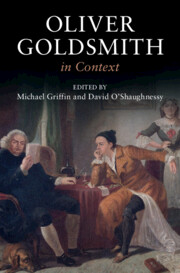Book contents
- Oliver Goldsmith in Context
- Oliver Goldsmith in Context
- Copyright page
- Dedication
- Contents
- Illustrations
- Notes on Contributors
- Preface
- Chronology
- Abbreviations
- Part I Life and Career
- Part II Social, Cultural, and Intellectual Contexts
- Chapter 5 Enlightenments
- Chapter 6 Universities
- Chapter 7 Libraries
- Chapter 8 The Club
- Chapter 9 Irish London
- Chapter 10 Liberty
- Chapter 11 Cosmopolitanism
- Chapter 12 Marriage
- Chapter 13 Gender
- Chapter 14 Race
- Chapter 15 Religion
- Chapter 16 Natural History and Science
- Chapter 17 War and Empire
- Chapter 18 Ghosts
- Part III Literary Contexts
- Part IV Critical Fortunes and Afterlives
- Further Reading
- Index
Chapter 10 - Liberty
from Part II - Social, Cultural, and Intellectual Contexts
Published online by Cambridge University Press: 28 November 2024
- Oliver Goldsmith in Context
- Oliver Goldsmith in Context
- Copyright page
- Dedication
- Contents
- Illustrations
- Notes on Contributors
- Preface
- Chronology
- Abbreviations
- Part I Life and Career
- Part II Social, Cultural, and Intellectual Contexts
- Chapter 5 Enlightenments
- Chapter 6 Universities
- Chapter 7 Libraries
- Chapter 8 The Club
- Chapter 9 Irish London
- Chapter 10 Liberty
- Chapter 11 Cosmopolitanism
- Chapter 12 Marriage
- Chapter 13 Gender
- Chapter 14 Race
- Chapter 15 Religion
- Chapter 16 Natural History and Science
- Chapter 17 War and Empire
- Chapter 18 Ghosts
- Part III Literary Contexts
- Part IV Critical Fortunes and Afterlives
- Further Reading
- Index
Summary
This chapter shows how ‘Liberty’ gained an ideological colouring in the eighteenth century largely due to its capacity to embrace a number of artistic/political perspectives, from an opposition to the legacy of anti-Walpole sentiments derived from centralising governmental influence, to an aesthetic reversal of taste away from generic prescription to a specific association with Whiggish denial of some inherited property rights. Goldsmith is rarely regarded as a deep political thinker, yet he mixed with several who could be thought to be polemicists for Liberty. This chapter shows how his poetry (The Traveller and The Deserted Village), plays (The Good Natur’d Man and She Stoops to Conquer) and his prose (The Citizen of the World) gave voice to his interrogation of English libertarian myths.
Keywords
- Type
- Chapter
- Information
- Oliver Goldsmith in Context , pp. 80 - 87Publisher: Cambridge University PressPrint publication year: 2024

